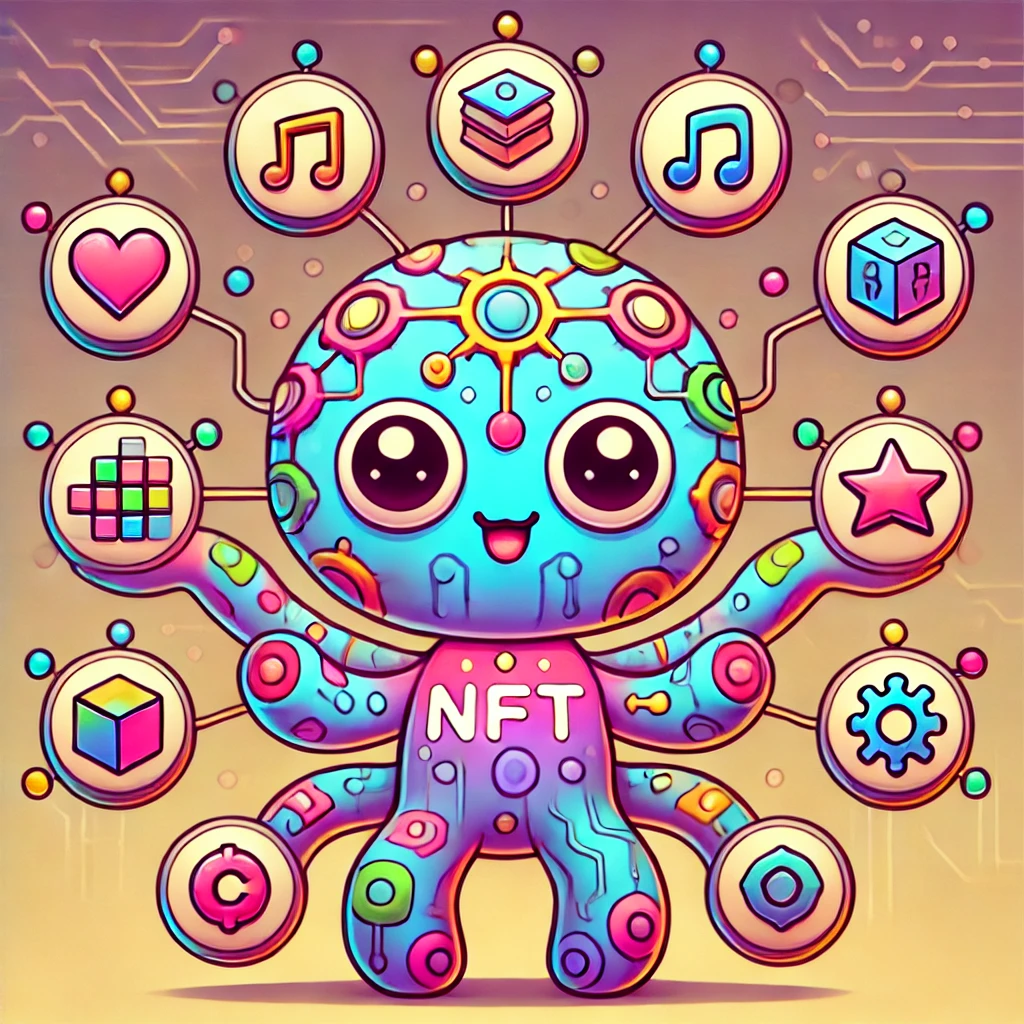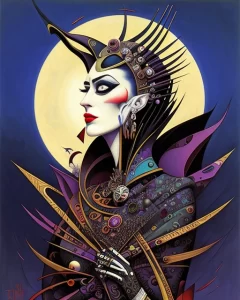The world of NFTs (Non-Fungible Tokens) is a dynamic and ever-evolving landscape. While initially associated with digital art and collectibles, NFTs have branched out into various sectors, each with its unique characteristics and applications. This comprehensive guide delves into the diverse types of NFTs, providing a detailed understanding of their functionalities, benefits, and limitations.
Table of Contents:
NFT Categories: Exploring the Spectrum
Categorizing NFTs is a useful approach to navigate this growing field. Broadly, NFTs can be classified into:
Art and Collectibles
The most prevalent category, NFTs in this space, represent unique digital assets, often artistic creations such as images, videos, music, or 3D models. These NFTs offer creators a novel way to monetize their work and establish ownership and provenance.
Key Characteristics:
- Uniqueness: Each NFT represents a single, irreplaceable asset.
- Digital Ownership: NFTs offer proof of ownership on the blockchain, removing ambiguity.
- Scarcity: Limited editions or one-of-a-kind NFTs contribute to their value.
- Secondary Market: NFTs can be traded for profits on secondary marketplaces.
Examples:
- CryptoPunks: Iconic pixelated avatars with a cult following.
- Bored Ape Yacht Club: Popular collection of cartoon apes with exclusive community benefits.
- Beeple’s “Everydays – The First 5000 Days”: Record-breaking digital artwork sold for over $69 million.
Gaming
NFTs are transforming the gaming landscape by empowering players with ownership and control over in-game assets. Players can buy, sell, and trade virtual items, creating economies within games and enhancing gameplay.
Key Characteristics:
- In-Game Item Ownership: Players own their virtual items, which can be traded outside the game.
- Interoperability: NFTs can be used across multiple platforms and games.
- Play-to-Earn: Some games allow players to earn cryptocurrency by playing, fostering a new economic model.
- Decentralized Ownership: Players are no longer dependent on game developers for asset ownership.
Examples:
- Axie Infinity: A popular play-to-earn game featuring digital creatures that can fight and breed.
- Decentraland: A virtual reality world where users can buy, sell, and develop land.
- The Sandbox: A game that allows users to create and monetize their own experiences and assets.
Music
NFTs offer musicians a new way to connect with fans and monetize their work directly. NFTs can represent albums, concert tickets, or even unique audio experiences.
Key Characteristics:
- Direct Artist-Fan Connection: NFTs can be used to distribute music and offer exclusive content to fans.
- Royalty Payments: NFTs can be programmed to pay artists a percentage of each resale, ensuring ongoing income.
- Limited Edition Releases: Musicians can create rare NFTs of their work, building exclusivity and collector value.
Examples:
- Kings of Leon: Released their album “When You See Yourself” as an NFT, allowing fans to own a unique copy.
- Steve Aoki: Auctioned limited editions of his music NFTs, offering exclusive access to his music and events.
- The Weeknd: Launched his “XO” NFT collection, giving fans access to exclusive content and benefits.
Domain Names
NFTs are being used to create unique and secure domain names for websites on the blockchain. These domain names can be bought, sold, or transferred without the need for intermediaries.
Key Characteristics:
- Decentralized Ownership: Domain names are not controlled by centralized authorities.
- Web3 Integration: Seamless integration with decentralized platforms and applications.
- Security: NFTs prevent domain name hijacking and fraudulent activities.
- Customizability: Users can create their own unique domain names.
Examples:
- Ethereum Name Service (ENS): A popular platform for registering and managing Ethereum domain names.
- Unstoppable Domains: Offers human-readable, secure domain names on the blockchain.
- Handshake: A decentralized naming system that enables users to register and own domain names.
Tickets and Events
NFTs can revolutionize the ticketing industry by offering secure, transferable, and verifiable tickets for events. This eliminates fraud and provides artists and organizers with greater control over ticket distribution.
Key Characteristics:
- Anti-Counterfeiting: Each ticket is unique and verifiable on the blockchain, preventing duplication.
- Resale Control: Organizers can set rules for ticket resale, limiting scalping and ensuring fair prices.
- Enhanced Fan Engagement: NFTs can include exclusive perks and experiences for ticket holders.
Examples:
- Live Nation: Utilizing NFTs for concert ticketing, offering unique features and benefits to fans.
- The Rolling Stones: Employed NFTs for concert tickets, allowing fans to resell them securely on a secondary market.
- NBA: Utilizing NFTs for basketball game tickets, offering exclusive access and fan experiences.
Identity and Credentials
NFTs can be used to represent digital identities and qualifications, allowing users to store and share verifiable credentials securely on the blockchain. This enables seamless and efficient verification of identity and skills.
Key Characteristics:
- Self-Sovereign Identity: Users have complete control over their data.
- Transparency and Verifiability: Credentials are verifiable on the blockchain.
- Security: NFTs prevent credential forgery and manipulation.
Examples:
- University Degrees: Universities can issue NFT-based diplomas, ensuring authenticity and easy verification.
- Professional Certifications: Professional bodies can use NFTs to issue and manage certifications, facilitating seamless verification for employers.
- Digital Identity: Users can create NFT-based digital identities, combining personal credentials and preferences.
Real Estate
NFTs are being used to tokenize real estate assets, offering fractional ownership and streamlined transactions on the blockchain. This allows for increased liquidity and accessibility in the real estate market.
Key Characteristics:
- Fractionalized Ownership: Investors can buy portions of large real estate properties.
- Improved Liquidity: NFTs enable faster and more efficient transactions.
- Transparency: All transactions are recorded on the blockchain.
Examples:
- Propy: A platform that uses NFTs for real estate tokenization.
- Brickblock: A blockchain-based platform for real estate investment.
- RealT: A platform for fractionalizing ownership of real estate properties.
Supply Chain Management
NFTs can be used to track and manage physical assets throughout the supply chain, ensuring transparency and traceability. This helps to prevent fraud and improve efficiency.
Key Characteristics:
- Product Provenance: NFTs can track the origin and journey of products.
- Transparency and Traceability: All transactions and movements are recorded on the blockchain.
- Counterfeit Prevention: NFTs help to identify and prevent counterfeit products.
Examples:
- Walmart: Using NFTs to track food products in its supply chain.
- L’Oréal: Leveraging NFTs for product authenticity and provenance.
- IBM Food Trust: A blockchain platform using NFTs for supply chain transparency.
Advantages of NFTs
The versatile nature of NFTs brings with it a wide range of benefits, making them increasingly attractive across diverse industries:
1. Digital Ownership and Proof of Authenticity
NFTs provide indisputable proof of ownership and authenticity for digital assets. This is a significant advantage for creators and collectors, as it eliminates uncertainties regarding ownership and protects their assets from unauthorized copying or duplication.
2. Increased Liquidity and Accessibility
NFTs make digital assets more liquid and accessible by enabling them to be traded on decentralized marketplaces. This allows for easier buying, selling, and transferring ownership, encouraging market growth and participation.
3. Transparency and Traceability
The transparency of blockchain technology ensures that all transactions related to NFTs are recorded and publicly verifiable. This enhances accountability and trust, enabling tracking and verification throughout the entire lifecycle of an asset.
4. Programmable Features
NFTs can be programmed with unique features, such as royalties and access rights. This enables creators to control the distribution and monetization of their work, as well as providing unique benefits to NFT holders.
5. New Economic Models
NFTs have the potential to revolutionize existing economic models, allowing for direct interaction between creators and consumers. Play-to-Earn games and artist-driven marketplaces are prime examples of how NFTs are shaping new and innovative economic realities.
Limitations of NFTs
While NFTs offer compelling advantages, it’s crucial to acknowledge the challenges and limitations they present:
1. Volatility and Market Risk
The NFT market is highly volatile, subject to dramatic price fluctuations and unpredictable trends. This presents significant financial risks for investors, especially those new to the space.
2. Environmental Concerns
The energy consumption associated with some blockchain networks, particularly Proof-of-Work (PoW) consensus mechanisms, has raised environmental concerns. While newer, more efficient blockchains are emerging, energy consumption remains a point of contention for NFTs.
3. Scalability and Infrastructure
The scalability of blockchain networks, particularly in handling large volumes of transactions, is a challenge. As the NFT market grows, the ability of blockchains to handle increasing demands becomes critical.
4. Regulatory Uncertainty
Regulatory frameworks for NFTs are still being developed across various jurisdictions. This uncertainty can create legal complexities and risks for participants in the NFT ecosystem.
5. Security Risks
The decentralized nature of NFTs can be both a strength and a weakness. While it enhances security against centralized attacks, vulnerabilities within smart contracts can still pose threats. Scams and fraudulent activities remain prevalent, requiring vigilance on the part of NFT users.
Conclusion: Embracing the Future of Digital Ownership
NFTs are rapidly evolving, carving out a new and exciting frontier in the digital economy. From revolutionizing digital art and collectibles to transforming gaming, events, and supply chains, NFTs offer a wide range of possibilities. Recognizing their benefits and limitations is crucial for navigating this rapidly changing landscape. As blockchain technology continues its advancement and regulatory landscapes mature, NFTs are poised to play an increasingly significant role in shaping the future of digital ownership and the way we interact with digital assets.
Q&A
What are the different categories of NFTs?
NFTs can be broadly categorized into Art and Collectibles, Gaming, Music, Domain Names, Tickets and Events, Identity and Credentials, Real Estate, and Supply Chain Management. Each category has distinct characteristics and applications, showcasing the versatility of NFTs.
What are the primary advantages of using NFTs?
NFTs offer several advantages, including: digital ownership and proof of authenticity, increased liquidity and accessibility, transparency and traceability, programmable features, and the ability to create new economic models.
What are the limitations of NFTs?
While NFTs present many benefits, there are also limitations to consider: market volatility and risk, environmental concerns, scalability challenges, regulatory uncertainty, and security risks.
What are the future implications of NFTs?
NFTs hold significant future implications, potentially transforming various industries. As blockchain technology matures and regulatory frameworks develop, NFTs are likely to play an increasingly prominent role in reshaping how we interact with digital assets and build new economic models.
Are NFTs a good investment?
The value and potential of NFTs as investment vehicles are highly debated. The market is volatile and subject to speculation. It is crucial to conduct thorough research, understand the risks involved, and approach NFT investments with caution.
Should I buy NFTs?
The decision to purchase NFTs depends on individual circumstances and investment goals. Consider your risk tolerance, the specific NFT, and the potential for future appreciation before making a purchase.






